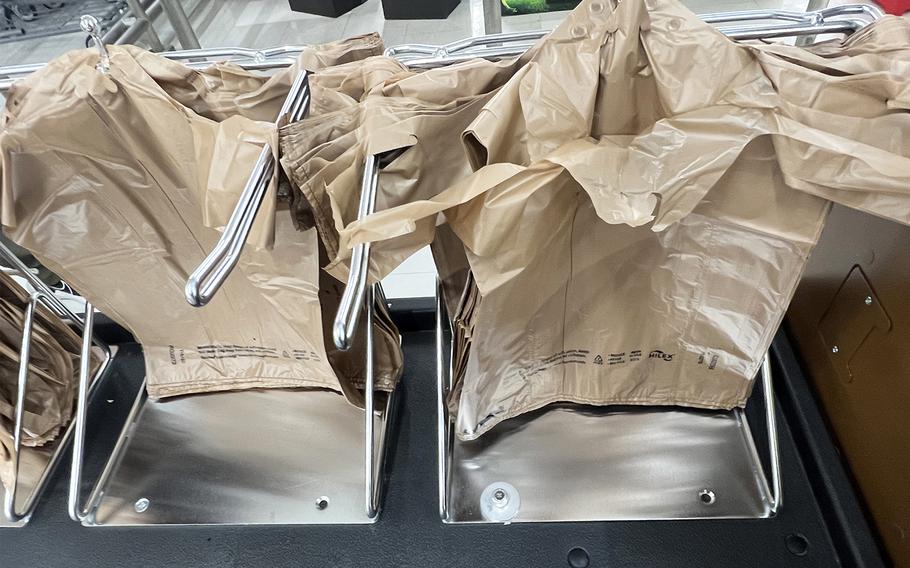
The Defense Commissary Agency intends to do away with single-use plastic bags first in locations where state or local bans are already in place and then move to discontinue their use worldwide. (Kelly Agee/Stars and Stripes)
U.S. military commissaries will begin phasing out plastic bags at checkout lanes starting March 15 with two stores on Guam, according to the Defense Commissary Agency.
DeCA intends to do away with single-use bags first in locations where state or local bans are already in place, including Hawaii and California, and then move to discontinue their use worldwide, agency spokesman Keith Desbois told Stars and Stripes by email Tuesday.
“We plan to implement a phased approach to eliminate single-use bags that takes into account our patrons’ needs and logistical limitations,” he wrote.
Andersen Air Force Base and Naval Base Guam will be the first of the 236 commissaries to discontinue their use, Desbois said.
Removing plastic bags from Guam brings DeCA into compliance with a local law that came into effect Jan. 1, 2021. The Guam Environmental Protection Agency enforces the ban on single-use plastic bags with a $500 fine for the first offense; subsequent violations can cost up to $10,000.
“The Defense Commissary Agency is committed to complying with applicable local and territorial laws restricting the use of plastic and paper single-use bags,” Desbois wrote.
He said DeCA already has a “robust recycling program” and is a leader in conserving energy and water and solid waste reduction.
“We do recognize that with any change there are concerns and we will provide additional resources toward education and awareness to ease the transition,” Desbois said.
Plastic bags that end up in landfills or the environment take more than 1,000 years to decompose and pose a risk to animals that encounter them, according to the United Nations Environment Program. Decomposing plastic also releases microplastics into the soil and water.
Bangladesh became the first country to ban single-use plastic bags back in 2002 and more than 100 nations have a full or partial ban on them, according to a May article in Euronews.
Desbois said DeCA has yet to gauge reaction from commissary patrons on the change.
At Yokota Air Base, an airlift hub in western Tokyo, Tech. Sgt. Gabriel Yumol called the plastic bags at checkout lanes an expendable convenience.
“I get it; we’re trying to save the environment,” he said outside the store Feb. 29. “I’m OK because I can just grab one of my reusable bags. I have 100 of them in my house that I have never used.”